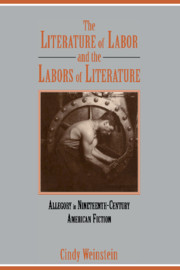 The Literature of Labor and the Labors of Literature
The Literature of Labor and the Labors of Literature Published online by Cambridge University Press: 06 July 2010
When President Theodore Roosevelt addressed an audience of journalists at the Gridiron Club in Washington, D.C., in 1906, little did he know that his speech would bequeath a name to a group of newspaper writers who brought to the public's attention the corruption of politics, business, and labor unions that would define their journalistic efforts as an historical movement of the early twentieth century. These were, of course, the muckrakers, a coterie of writers dedicated to exposing the worst in American society, whether they found it in the Standard Oil Company, as did Ida Tarbell, or in Chicago's meatpacking industry, as did Upton Sinclair. The muckrakers considered everything and everyone fair game. Indeed, when Cosmopolitan featured an article by David Graham Phillips about Chauncey Depew, the United States senator from New York, Roosevelt felt that he could no longer refrain from speaking out against the methods and intent of this new journalism. “With the muckrake,” Roosevelt claims, this kind of writer “speedily becomes, not a help to society, not an incitement to good, but one of the most potent forces of evil.” In choosing the figure of the muckraker, Roosevelt firmly situated himself in the tradition of American allegory initiated in Hawthorne's texts - the radical tradition of an economics of allegory whose contours have been the subject of this book. That Roosevelt used the figure of the muckraker, who, after all, made his first appearance in The Pilgrim's Progress, to describe the activities of these journalists speaks to the enduring cultural power of Bunyan's text and, more important, makes fully explicit the critique of American individualism and the work ethic that had always inhered within allegory but had remained relatively implicit.
To save this book to your Kindle, first ensure [email protected] is added to your Approved Personal Document E-mail List under your Personal Document Settings on the Manage Your Content and Devices page of your Amazon account. Then enter the ‘name’ part of your Kindle email address below. Find out more about saving to your Kindle.
Note you can select to save to either the @free.kindle.com or @kindle.com variations. ‘@free.kindle.com’ emails are free but can only be saved to your device when it is connected to wi-fi. ‘@kindle.com’ emails can be delivered even when you are not connected to wi-fi, but note that service fees apply.
Find out more about the Kindle Personal Document Service.
To save content items to your account, please confirm that you agree to abide by our usage policies. If this is the first time you use this feature, you will be asked to authorise Cambridge Core to connect with your account. Find out more about saving content to Dropbox.
To save content items to your account, please confirm that you agree to abide by our usage policies. If this is the first time you use this feature, you will be asked to authorise Cambridge Core to connect with your account. Find out more about saving content to Google Drive.